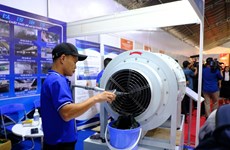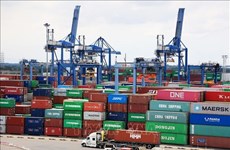Non-cash payment promoted nationwide
State agencies have reached their
target one year ahead of schedule after three years of implementing a
scheme on non-cash payment.
State agencies have reached their
target one year ahead of schedule after three years of implementing a
scheme on non-cash payment.
Director of the State Bank of Vietnam (SBV)’s Department of Payment Bui Quang Tien said that the ratio of cash payment had fallen from 16.36 percent in 2007 to 14 percent in June, with more than 17 million ATM cards now in the market. The project targets were 18 percent and 15 million ATM cards, respectively.
Deputy Finance Minister Tran Van Hieu said that non-cash payment will help customers and the banking system save costs for cash reserve and counting.
This will also help increase the safety and transparency of transactions in line with standards and conditions of international financial institutions, he noted.
ATM cards have been booming since the Government issued a directive on salary payments through bank accounts for staff who are paid by the State.
The number of agencies using ATM cards quadrupled in early 2009 against the previous year, said the SBV.
However, Tien said, non-cash payment in Vietnam has not been popular as cash remains the main method of payment at state companies, agencies and residents. Although the number of individuals using ATM cards has passed the 2010 target, card users only withdraw their cash to pay for services and goods, he added.
The quality and the convenience of non-cash payment remains limited, Tien explained, adding that online payment services like Mobile Banking, Internet Banking and E-wallet are only being used on a small scale.
To promote non-cash payment, the Finance Ministry has implemented a scheme to modernise tax collection process between taxation and customs agencies, the State Treasury, and commercial banks.
The General Department of Taxation and the State Treasury have collaborated with the Vietnam Joint Stock Commercial Bank for Industry and Trade, the Bank for Investment and Development of Vietnam and the Bank for Agriculture and Rural Development to transfer money from tax payers’ accounts to the State Treasury’s.
Banking experts emphasised the importance of overcoming technological differences in the system to expand non-cash payment method./.
Director of the State Bank of Vietnam (SBV)’s Department of Payment Bui Quang Tien said that the ratio of cash payment had fallen from 16.36 percent in 2007 to 14 percent in June, with more than 17 million ATM cards now in the market. The project targets were 18 percent and 15 million ATM cards, respectively.
Deputy Finance Minister Tran Van Hieu said that non-cash payment will help customers and the banking system save costs for cash reserve and counting.
This will also help increase the safety and transparency of transactions in line with standards and conditions of international financial institutions, he noted.
ATM cards have been booming since the Government issued a directive on salary payments through bank accounts for staff who are paid by the State.
The number of agencies using ATM cards quadrupled in early 2009 against the previous year, said the SBV.
However, Tien said, non-cash payment in Vietnam has not been popular as cash remains the main method of payment at state companies, agencies and residents. Although the number of individuals using ATM cards has passed the 2010 target, card users only withdraw their cash to pay for services and goods, he added.
The quality and the convenience of non-cash payment remains limited, Tien explained, adding that online payment services like Mobile Banking, Internet Banking and E-wallet are only being used on a small scale.
To promote non-cash payment, the Finance Ministry has implemented a scheme to modernise tax collection process between taxation and customs agencies, the State Treasury, and commercial banks.
The General Department of Taxation and the State Treasury have collaborated with the Vietnam Joint Stock Commercial Bank for Industry and Trade, the Bank for Investment and Development of Vietnam and the Bank for Agriculture and Rural Development to transfer money from tax payers’ accounts to the State Treasury’s.
Banking experts emphasised the importance of overcoming technological differences in the system to expand non-cash payment method./.













